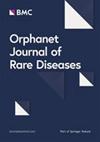Meta-analysis of bone mineral density in adults with phenylketonuria
IF 3.4
2区 医学
Q2 GENETICS & HEREDITY
引用次数: 0
Abstract
Lifelong management of phenylketonuria (PKU) centers on medical nutrition therapy, including dietary phenylalanine (Phe) restriction in addition to Phe-free or low-Phe medical foods/protein substitutes. Studies have reported low bone mineral density (BMD) in mixed-age PKU populations, possibly related to long-term Phe restriction. Therefore, a meta-analysis investigating BMD specifically in adults with PKU was conducted. Studies reporting BMD-related outcomes were identified from a systematic literature review evaluating somatic comorbidities experienced by adults with PKU on a Phe-restricted diet (searched February 1, 2022, updated November 1, 2023). Risk of study bias was assessed (Scottish Intercollegiate Guidelines Network checklists). The primary outcome of the meta-analysis was pooled mean BMD Z-scores of different bones. Secondary outcomes were the prevalence of low BMD Z-scores at pre-specified thresholds. Subgroup analyses of mean BMD Z-scores (decade of study publication, controlled versus uncontrolled blood Phe levels, gender) were conducted. BMD-related data from 4097 individuals across 10 studies rated as at least acceptable quality were included. Mean BMD Z-scores were statistically significantly lower compared with an age-matched control or reference (non-PKU) population, across bones, but still within the expected range for age (> -2.0): lumbar spine (seven studies, n = 304), -0.63 (95% confidence interval (CI): -0.74, -0.52); femoral neck (four studies, n = 170), -0.74 (95% CI: -1.25, -0.22); radius (three studies, n = 114), -0.77 (95% CI: -1.21, -0.32); total body (four studies, n = 157), -0.61 (95% CI: -0.77, -0.45). The small number of observations in the subgroup analyses resulted in a high degree of uncertainty, limiting interpretation. Estimated prevalence of BMD Z-scores ≤ -2.0 was 8% (95% CI: 5%, 13%; four studies, n = 221) and < -1.0 was 42% (95% CI: 35%, 51%; five studies, n = 144). Adults with PKU had lower BMD Z-scores than the reference (non-PKU) population but < 1 in 10 were below the expected range for age. The low number of studies prevents identification of which population characteristics are most impacting BMD. This meta-analysis was supported by BioMarin Pharmaceutical Inc., Novato, CA and is registered with the Research Registry (reviewregistry1476).苯丙酮尿症成人骨矿物质密度的元分析
苯丙酮尿症(PKU)的终生治疗以医学营养疗法为中心,包括限制饮食中的苯丙氨酸(Phe),以及不含 Phe 或低 Phe 的医学食品/蛋白质替代品。有研究报告称,混龄 PKU 患者的骨矿物质密度(BMD)较低,这可能与长期限制 Phe 有关。因此,我们进行了一项荟萃分析,专门调查了患有 PKU 的成年人的骨密度。报告 BMD 相关结果的研究是从评估限制 Phe 饮食的 PKU 成人躯体并发症的系统性文献综述中发现的(2022 年 2 月 1 日检索,2023 年 11 月 1 日更新)。对研究偏倚风险进行了评估(苏格兰校际指南网络核对表)。荟萃分析的主要结果是不同骨骼的集合平均 BMD Z 分数。次要结果是在预先指定的阈值下低 BMD Z 值的发生率。对平均 BMD Z 值进行了分组分析(研究发表的年代、受控与未受控的血 Phe 水平、性别)。共纳入了 10 项被评为质量至少可接受的研究中 4097 人的 BMD 相关数据。与年龄匹配的对照组或参照组(非 PKU)人群相比,各骨骼的平均 BMD Z 值在统计学上显著降低,但仍在年龄的预期范围内(> -2.0):腰椎(7 项研究,n = 304),-0.63(95% 置信区间 (CI):-0.74, -0.52);股骨颈(四项研究,n = 170),-0.74(95% CI:-1.25, -0.22);桡骨(三项研究,n = 114),-0.77(95% CI:-1.21, -0.32);全身(四项研究,n = 157),-0.61(95% CI:-0.77, -0.45)。亚组分析中的观察结果数量较少,因此不确定性较高,限制了对结果的解释。估计BMD Z-scores≤-2.0的患病率为8%(95% CI:5%,13%;4项研究,n = 221),<-1.0的患病率为42%(95% CI:35%,51%;5项研究,n = 144)。与参考人群(非 PKU)相比,患有 PKU 的成年人的 BMD Z 值较低,但低于预期年龄范围的人数不足十分之一。由于研究数量较少,因此无法确定哪些人群特征对 BMD 影响最大。这项荟萃分析得到了加利福尼亚州诺瓦托市 BioMarin 制药公司的支持,并已在研究注册中心注册(reviewregistry1476)。
本文章由计算机程序翻译,如有差异,请以英文原文为准。
求助全文
约1分钟内获得全文
求助全文
来源期刊

Orphanet Journal of Rare Diseases
医学-医学:研究与实验
CiteScore
6.30
自引率
8.10%
发文量
418
审稿时长
4-8 weeks
期刊介绍:
Orphanet Journal of Rare Diseases is an open access, peer-reviewed journal that encompasses all aspects of rare diseases and orphan drugs. The journal publishes high-quality reviews on specific rare diseases. In addition, the journal may consider articles on clinical trial outcome reports, either positive or negative, and articles on public health issues in the field of rare diseases and orphan drugs. The journal does not accept case reports.
 求助内容:
求助内容: 应助结果提醒方式:
应助结果提醒方式:


